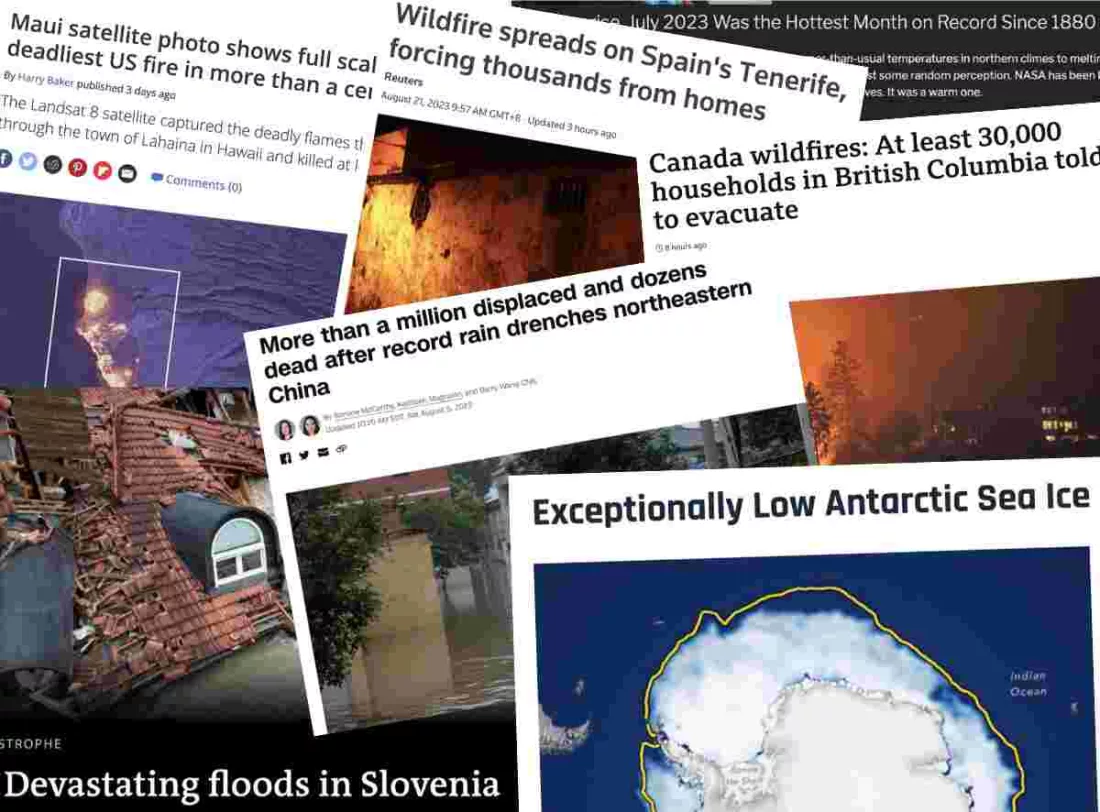Climate change has been prominent in worldwide news this summer (2023), notably as we have just lived through the hottest week for perhaps 100,000 years. Given a series of global warming events, we should have alarm bells ringing, sirens sounding, along with efforts to change our ways; yet instead the response is a collective “meh”, as if we can simply carry on and all will be fine.

There are parallels between the subject of another recent news story, the Titan submarine, and our approach to climate change. In both cases, humans are facing challenges arising from basic physics – pressure hugely increasing with depth in the case of Titan; and more heat trapped as we add greenhouse gases to the atmosphere. And in both cases, there is (or was!) a cavalier response to the challenges, never mind what actual experts say.
The result was predictable and instantaneous with Titan: the design and materials were simply not up to withstanding pressures of up to 400 atmospheres as it descended to around 4000 metres below sea level. There had been abundant warnings from people with a wealth of experience in deep sea submersibles, and even the carbon fibre hull made noises that foreshadowed the inevitable implosion.
While the results of climate change are more complex, they are also broadly predictable. And in this case, we are responsible for the challenges as well as how to deal with them.
Of course, before dealing with these challenges, it’s important to acknowledge they exist. One long-standing issue with climate change is denial that it is even happening. To me, that’s akin to not believing water pressure will rise as a submarine descends. Strip away the complexities, and at its heart climate change is based on rising emissions of gases that trap heat from the sun, in turn causing increasing temperatures.
“Yes, I know, these are called greenhouse gases, like carbon dioxide from burning fossil fuels,” you’re hopefully thinking. But I note the basics here, as many people seem unable to grasp the concept, perhaps as they have been bamboozled – gaslit – by well-funded attempts to deny climate change is happening, or important.
Nowadays, you would need to have been very effectively duped, and with heavy blinkers on, to believe the earth’s climate systems are not changing for the worse. Everything, Everywhere, All at Once was a snazzy title for a movie, yet seems to apply here too.
I’ve written about climate change before, and each time found a handful of related weather events in the news. Today, however, there is a veritable embarrassment of riches when it comes to news of unusual weather events. Ongoing severe heatwaves are affecting southern Europe, the US and China – where a temperature of 52.2C at Sanbao in Xinjiang set a new national record, and fell just shy of an almost simultaneous 53.3C at Furnace Creek, Death Valley, in the US. Severe rainfall events have also occurred, notably in the northeast US, Delhi, and southwest Japan, where three people died in the region’s “heaviest rain ever”.
The oceans have been absorbing much of the earth’s excess heat, and this year has seen reports of widespread marine heatwaves, including waters around Florida reaching a record 35C, threatening marine life. On 17 July 2023, Typhoon Talim passed Hong Kong, just three days after entering the South China Sea as a mere low pressure system.
Typhoons have historically caused severe damage and loss of life in Hong Kong, especially as a result of storm surges. Yet Hong Kong aims to build the huge Kau Yi Chau reclamation scheme, supposedly high enough to avoid storm waves, and the Sustainable Lantau Office overseeing this has informed me via email that “about 27% of Hong Kong’s total population and 70% of its commercial activities are being accommodated on reclaimed land”. This latter point is surely not a plus, but cause for concern – rising seas plus more intense typhoons could result in severe storm surges that swamp and damage swathes of land.
A metropolis is also planned for northern Hong Kong, on land that could be flooded. Meanwhile, work proceeds with building one of the world’s largest waste incinerators – yes, set to emit more greenhouse gases – on a reclamation south of Lantau, highly exposed to storms. Five years ago, Typhoon Mangkhut served warning that urban areas can be impacted by storm surges, even at low tide, yet precious little has been done to safeguard against them.
Plus, of course, Hong Kong abounds with glass facades that are almost taunting a typhoon to arrive and toss debris at them in hurricane-force winds.
The government does publish and update Hong Kong’s Climate Action Plan, yet the emphasis is on “decarbonisation”, and the last chapter covers “Opportunities”. The lack of urgency and rather rose-tinted view are surely typical of places worldwide.
Since being established in 1988, the Intergovernmental Panel on Climate Change has typically issued reports that are more upbeat than the concerns of climate scientists. Yet in Climate Change 2023, the IPCC reported, “Climate change is a threat to human well-being and planetary health. There is a rapidly closing window of opportunity to secure a liveable and sustainable future for all.”
When the Titan wreckage was found, there was nothing left of the occupants except “presumed human remains”. As we carry on supercharging and barely preparing for climate change, we’re on course for a future of increasing disasters that may leave just remnants of human civilisation clinging on.
That’s a grim prognosis, of course, albeit arising from scientific principles, as we shift from the “Goldilocks Zone” of being not too hot, not too cold for life on earth. Yet fear can prompt action, and a recent study reported by Phys.org found “Doom-and-gloom climate news may scare but also encourage audiences”. Which is of course my hope here; perhaps you can do more – in your daily life, and advocating for changes by companies and even governments.
Written for the South China Morning Post
